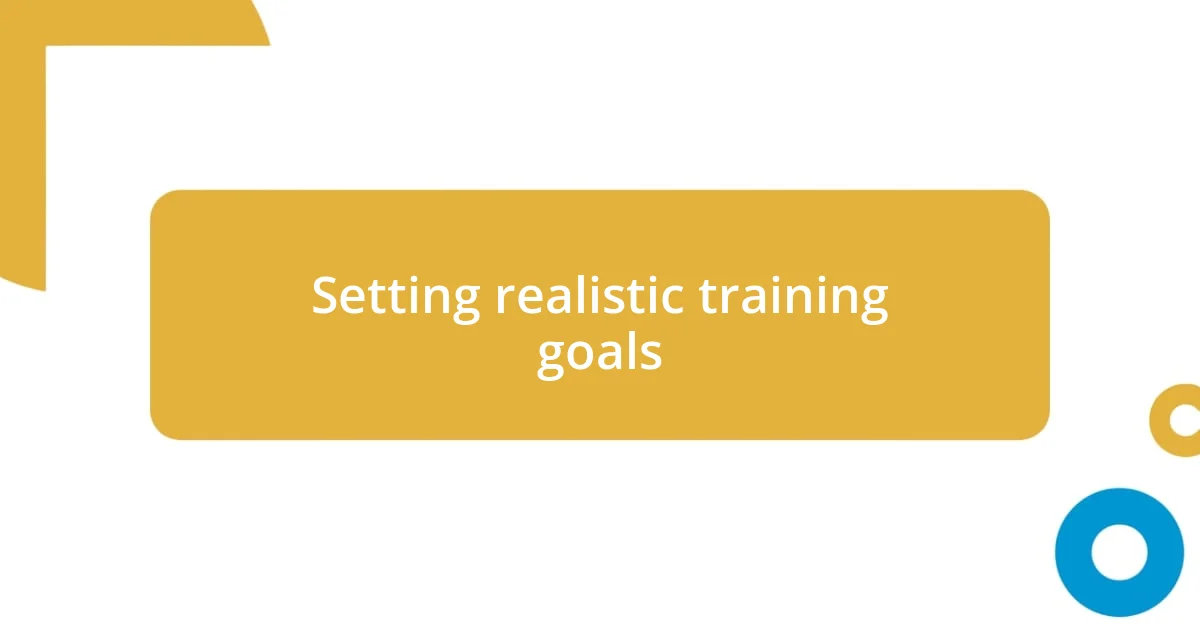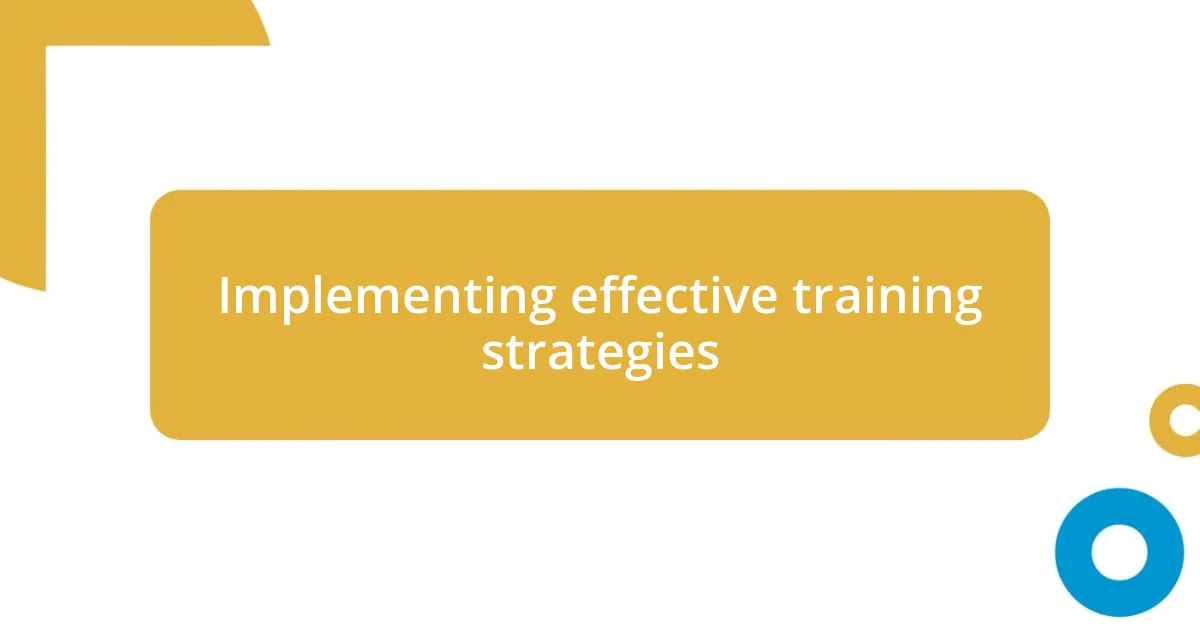Key takeaways:
- Identifying training challenges, such as consistency, goal-setting, and information overload, is crucial for personal growth and motivation.
- Implementing effective strategies like tracking progress, adapting flexible routines, and incorporating diverse training styles enhances performance and enjoyment.
- Seeking support from others and celebrating both small victories and significant milestones fosters a sense of community and boosts motivation throughout the training journey.

Identifying my training challenges
When I first started my training journey, I quickly realized that identifying my challenges was more complex than I anticipated. For instance, I often found myself overwhelmed by information, unsure of where to start. Have you ever felt like you were drowning in a sea of advice and resources? It made me question my abilities and dampened my motivation.
One specific challenge I faced was maintaining consistency in my routine. I remember a moment of frustration after a week of missed workouts—my self-doubt was creeping in. It prompted me to ask myself, “What’s truly holding me back? Is it time, fear, or something deeper?” Recognizing that my busy schedule was only part of the issue helped me to confront the emotional barriers that were tied to my commitment.
Additionally, I noticed that I struggled with setting realistic goals. Initially, I aimed for lofty targets without considering my actual progress. This led to feelings of disappointment, reminding me of a time when I attempted to run a mile but barely made it a quarter of the way. Reflecting on these moments taught me that failing to break down my goals into achievable steps only added to my frustration and hindered my growth. Each of these challenges made me more aware of my training landscape, opening my eyes to what I truly needed to overcome.

Analyzing my training routine
Analyzing my training routine revealed patterns I hadn’t noticed before. I remember one particular week when I logged every session meticulously. Reviewing that log was eye-opening; the data showed a stark inconsistency in my workout types. While I thought I was mixing it up, I actually leaned heavily on cardio, neglecting strength training altogether. It made me realize that a well-rounded routine is crucial for long-term progress.
Then there were days when I felt completely drained but pushed through workouts anyway. I discovered the importance of listening to my body. A moment comes to mind when I opted for a rest day instead of forcing myself to run, which ended up being a turning point. Trust me when I say this: knowing when to step back is just as vital as knowing when to push forward.
After a few months of routine analysis, I shifted from a rigid schedule to a more flexible one, allowing myself to adapt based on how I felt each week. This shift wasn’t easy; it took a considerable amount of self-reflection to let go of the guilt associated with skipping sessions. By embracing this flexibility, I found that my motivation increased significantly. It turned training from a chore into something I genuinely looked forward to.
| Training Routine Aspect | Initial Approach |
|---|---|
| Consistency | I pushed through even when tired. |
| Workout Variety | I focused heavily on cardio. |
| Flexibility | I had a rigid schedule. |

Setting realistic training goals
Setting realistic training goals is essential for maintaining motivation and avoiding burnout. I remember setting an overly ambitious goal of running a half-marathon within three months of starting to train. While the excitement fueled me initially, reality soon kicked in when my body struggled to keep up. The constant injuries led to more frustration than fulfillment, reminding me that ambition should be paired with strategy.
To create attainable goals, I found it helpful to consider the following:
- Start Small: Focus on beginner milestones, like running for 10 minutes without stopping before pushing for distance.
- Celebrate Progress: Acknowledge every achievement, no matter how minor; it keeps morale high.
- Adjust as Needed: If I missed a workout or felt off, rather than feeling defeated, I shifted my goals to reflect my current reality.
- Stay Flexible: Life throws curveballs, so I learned to adapt my plan without losing sight of the bigger picture.
Setting these realistic goals led to a more enjoyable journey than I ever thought possible. I learned to appreciate the process itself rather than just the outcome.

Seeking support from others
Recognizing the need for support was a game changer for me. I used to think I could tackle every challenge on my own, but that only led to burnout. Then, during a particularly tough phase, I reached out to a close friend who was also into fitness. Just listening to her share her struggles—and how she’d worked through them—made me feel less isolated. Have you ever felt that relief when someone else shares similar experiences? It’s like realizing you’re not alone in the storm.
Asking for help can feel daunting, but it’s truly empowering. I remember joining a local running group on a whim. At first, I was nervous about keeping up, but to my surprise, everyone was welcoming. Their encouragement, especially on days when I wanted to back out, was invaluable. There’s something special about sharing challenges; it transforms a solitary battle into a collective effort. Have you ever considered how much more fulfilling a journey can be when shared with others?
Sometimes, simply voicing my struggles to others has opened unexpected doors. I recall discussing my training hurdles with my gym coach, who offered a fresh perspective. His advice to incorporate strength training not just for gains but also for injury prevention made perfect sense. It’s fascinating to see how new viewpoints can shift my approach completely—like finding a missing puzzle piece. So, don’t underestimate the strength of a supportive community; it’s often the catalyst for overcoming our toughest challenges.

Implementing effective training strategies
Implementing effective training strategies can drastically change the way we approach our goals. I learned this firsthand when I shifted my focus to structured training plans. For instance, when I targeted a big race, I decided to follow a program that outlined specific workouts for each week. It took the guesswork out of my training and made every session feel purposeful. Have you ever felt directionless in your training? That’s exactly where I was before I embraced this strategy.
One effective method I discovered was tracked workouts. Tracking my runs not only highlighted my progress but also kept me accountable. I remember when I started graphing my weekly mileage; I was amazed to see how I gradually increased my distance. Each number represented a step outside my comfort zone—and that knowledge ignited a fire within me. Have you tried documenting your journey? You might be surprised by the motivation it can spark just by seeing your efforts laid out over time.
Moreover, I found that mixing various training styles kept things fresh and exciting. Combining cross-training with my running enhanced my overall performance and brought me joy. For instance, attending a spinning class not only challenged me physically but also broke the monotony of traditional running sessions. It was exhilarating! How often do we confine ourselves to one way of training? I realized that diversifying my methods didn’t just improve my fitness; it added a whole new layer of enjoyment to the process.

Tracking my progress regularly
Tracking my progress regularly was a transformative aspect of my training. I began by keeping a simple journal where I noted my workouts, how I felt, and any milestones I achieved. It’s remarkable how, just by penning down my experiences, I was able to reflect on my journey and appreciate my growth. Have you ever felt a rush of pride when looking back at what you’ve accomplished? For me, it turned those tough days into badges of honor.
I also embraced technology to enhance my progress tracking. Using a fitness app allowed me to visualize my workouts and see patterns over time. One day, glancing at my activity chart, it hit me—I was running faster than I had six months ago. That realization gave me a jolt of motivation during those moments when self-doubt crept in. Have you ever seen your own progress reflected back at you and felt unstoppable? It’s like a pep talk right when you need it.
In my experience, sharing my progress with my gym buddies brought accountability and camaraderie. There were days I wanted to skip a workout, but knowing my friends would check my training log kept me on track. I remember one evening, after a challenging week, they celebrated my improvements during a casual meetup. Their kind words fueled my fire even more. How can celebrating small victories with others amplify our motivation? For me, it turned mundane tracking into an exhilarating team effort, reminding me that the journey isn’t just solitary—it’s shared.

Celebrating my training successes
Achieving milestones in my training was like unearthing hidden treasures. I still vividly remember crossing the finish line of my first half marathon. As the crowd cheered, a wave of accomplishment washed over me—I had defied my doubts, embraced the training struggles, and emerged victorious. Have you ever felt such an electrifying rush from reaching a goal? It was a moment that made every early morning and late-night workout worthwhile.
One of the highlights of my training journey was the day I hit a new personal record in my 5K race. I had been struggling for weeks, battling fatigue and frustration. But that morning, I decided to channel my energy into positive thoughts. The exhilaration as I sprinted toward the finish line was a blend of disbelief and joy—a reminder that resilience often leads to extraordinary outcomes. Don’t you find that embracing positivity can transform your performance?
Celebrating successes doesn’t just come from big moments; it’s also about the little victories along the way. Each time I nailed a new workout or pushed through a tough session, I treated myself to something special. It might have been a new pair of running shoes or a decadent meal with friends. I realized that acknowledging those small wins kept my motivation alive. How often do we forget to celebrate the journey? In my experience, those moments of acknowledgment fueled my passion and provided the momentum I needed to tackle the next challenge.














